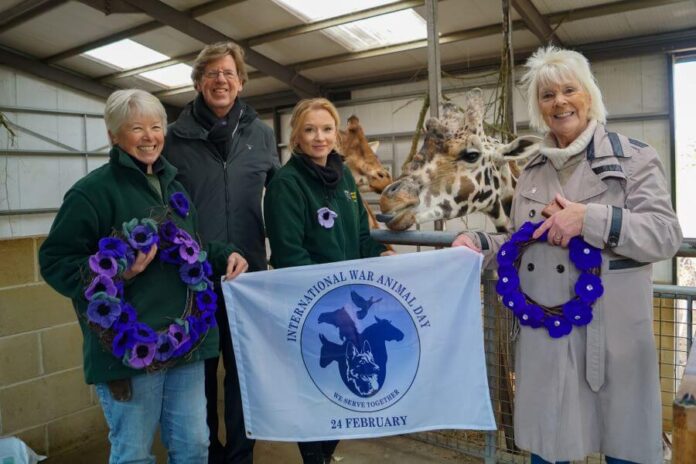
Animal and service organisations in six countries have come together to seek long overdue recognition for the part that animals have played in countless wars and conflicts.
The inaugural International War Animal Day is to be held tomorrow, on Saturday, February 24th 2024. Across Australia, New Zealand, America, Canada, France, and the UK flags will be flown, knitted poppy wreaths laid and purple candles lit at 11am local time to remember the sacrifice of tens of millions of animals who served – and continue to serve – alongside soldiers, to give us the freedom we all enjoy today.
Co-founders of The War Horse Memorial, Susan Osborne and Alan Carr MBE, were invited to the Park to officially launch International War Animal Day. One of the Park’s gardeners, Mandy Hicks, hand-knitted 150 purple poppies for the event. One of Mandy’s creations included a purple poppy blanket which adorned the Park’s oldest resident, 88-year-old Giant Tortoise George (who was born just before World War Two). It took 100 hours for Mandy to knit the 100 poppies needed.
Since 2019, Mandy has raised over £2,000 for The War Horse Memorial by selling her hand-knitted poppies to members of staff. This year, for the first time, to raise awareness and funds for The War Horse Memorial, Mandy’s poppies are on sale to visitors to the Park in the Gift Shop. It takes approximately one hour to knit each unique poppy.

Australia already leads the way with the national government recognising the contribution animals in war have played in their history. The aim now is to get the leaders and politicians from other countries to acknowledge February 24 as the day we all come together, to reflect on the many ways that animals have played their part.
For example, over 16 million animals served in the First World War alone. They were used for transport, communication, and companionship. Horse and camel-mounted troops were used in the desert campaigns throughout the conflict. Horses, donkeys, mules, and camels carried food, water, ammunition, and medical supplies to soldiers at the Front, and dogs and pigeons carried messages.
Canaries were used to detect poisonous gas, and cats and dogs were trained to hunt rats in the trenches. They didn’t volunteer but were taken from their farms, homes and from the streets to fuel the War effort. Few returned.

Alan Carr MBE, co-founder of The War Horse Memorial believes that Britain, as an animal loving nation, will want to get involved. He says:
“It starts with simple remembrance – the flying of the International War Animal Day flag, the laying of a wreath of knitted purple poppies or just the lighting of a candle – but we believe that, in time, it will be so much more. The purple poppy is the symbol we all recognise as a tribute to animals in war. We in the UK are using this special day to launch our 2024 Animal Purple Poppy Fund with new pin badges for humans and knitted poppies for their beloved pets now available from our shop www.thewarhorsememorial.org.
“We launched at the Cotswold Wildlife Park, in Burford, Oxfordshire, on Tuesday, February 20th 2024 when the Giraffes, Donkeys, two White Rhinos calves called Susie and Henry, and George, an 88-year-old Giant Tortoise, showed their support for War Animal Day with purple poppies knitted by gardener Mandy Hicks.
Then, the focus of remembrance will turn to Ascot, Berkshire, home of Poppy our War Horse, a national memorial dedicated to the millions of UK, Commonwealth and Allied horses, mules and donkeys lost during the Great War.
At 11am on Saturday, February 24 we will lay our wreath, fly our flag and light a candle, and we hope many other animal lovers will join us in this simple act of remembrance.”
Later this year, the play War Horse comes to Oxford for the festive run, which tells the story of the war horse Joey in First World War.
Cotswold Wildlife Park and Gardens
Burford, Oxfordshire, OX18 4JP
Advertisement
